Items
Tag is exactly
history
-
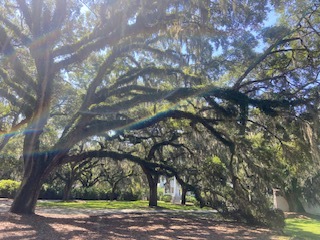 2023-07
2023-07Boston & Italy During Covid; Civil Rights Trip 2023
Prior to the world-stopping "Covid Times," my friends and I had planned to travel to Boston, MA. We were going to watch a Braves v. Red Sox game, visit Salem and the Freedom Trail in Boston. We had tickets, airfare, lodging etc. Then the world shut down. Because of life circumstances, we had to delay further after the world opened back up, and decided to shift gears and take a different trip. This would be a Civil Rights trip in the Summer of 2023. Again, life circumstances created the need to adjust. Two members of our group (half of us) were no longer able to travel, so myself and the other member of our group went. The trip was great. We flew into NC, then drove to Charleston where we spent a couple days. It was great because we were able to visit several places which were very impactful to both of us. McLeod Plantation was a wonderful & educational experience. We were given a fantastic guided tour where we learned much about the enslaved people who made the plantation function, and then about their descendants, some of whom lived there until the 1990's. We also visited the Old Slave Mart which was one of the most prominent sites in Charleston for slave sales. It has now been turned into a museum and memorial. From Charleston, we visited Savannah. We were only there about 12 hours, but were able to visit the house of a very prominent slave trader and see the living and working quarters of the people enslaved there. From there, we went to Atlanta (I got to watch a game at Truist Park!) for the night, and then on to Montgomery. If we could do it again, I would spend much more time in Montgomery. We visited the Legacy Museum which was, in a phrase, life changing. The experience was phenomenal and extremely visceral. I think it is something every American should experience at least once. We spent the whole day, and barely scratched the surface. And that was just the museum and monument. From Montgomery we drove to Selma and were able to walk the Edmund Pettus Bridge. We also drove around town a little and were able to see some of the churches, and neighborhood that were so influential in the Civil Rights Movement and the powerful Selma to Montgomery March. From there, we went to Memphis where we visited the National Civil Rights Museum. That was also a wonderful experience. This was such an awe-inspiring trip. It was very quick, but it was fantastic. It is a trip that I would take again though next time for longer. -
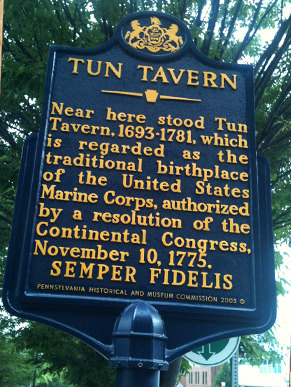 2021-03-12
2021-03-12Philadelphia Trip Covid Combat Corner
The pandemic was a very depressing time of limited activity that divided many by political responses. March 2020 is when the U.S. responded with stay at home responses followed by social distancing and testing. A year later in that same month of March, I was cornering my teammate for his fight for Cage Fury Fighting Championship in Philadelphia where some COVID measures still existed such as masks that we utilized on the plane and even during the warm up of the fight. Tests were required that had a swab impaled up our noses, but in hindsight it was a great experience especially as a historian where I toured many historical sites such as Benjamin Franklin's grave. -
2021-12-22
Charleston, South Carolina 2021 Christmas Trip
After COVID travel restrictions were lifted, my family and I seized the opportunity to visit Charleston, South Carolina to spend Christmas with my cousins. Despite the chill of December, we were able to explore the historic town at our leisure. While some shops remained open, their hours were adjusted due to the holiday season and COVID precautions. Similarly, many restaurants offered a limited menu, which disappointed my sister and me as we are both picky eaters. During our visit, we made sure to visit Magnolia Plantation and Gardens, a renowned historic house with beautiful gardens and one of the oldest plantations in the South. However, due to COVID, several attractions within the plantation were closed. It was also mandatory that we follow the necessary safety measures by wearing masks around other groups of people and inside the gift shop. Despite the limitations imposed by COVID, my time in Charleston was truly wonderful. I had the opportunity to immerse myself in the city's rich history, even if I couldn't fully explore all the places and shops as I had hoped. But most importantly, I cherished the moments spent with my family during this special holiday trip. -
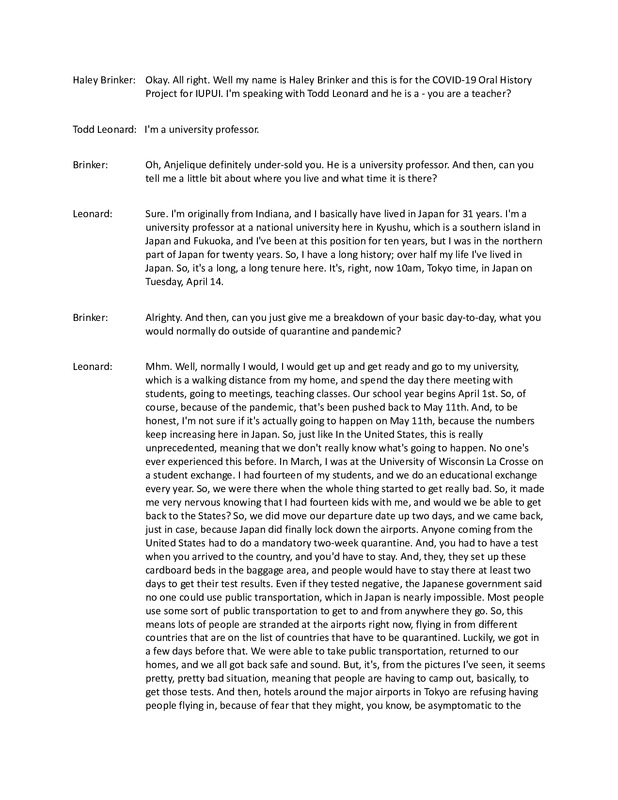 04/14/2020
04/14/2020Todd Leonard Oral History, 2020/04/14
-
 2023-05-16
2023-05-16News Article Analysis: India Is What Happens When Rich People Do Nothing
I will analyze this article focusing on the devastating impacts of the Covid-19 pandemic, including exploitation of marginalized groups like migrant workers, oxygen and other medical resource shortages, and the overall structural consequences of poor governance and health infrastructures in India. Not only does the writer Krishnan cater to the failures of the current Indian federal government during the pandemic, but he aims to point out the great moral failure of our whole generation, which has exposed the long-existing structural issues in providing for public healthcare and social security of Indian citizens. -
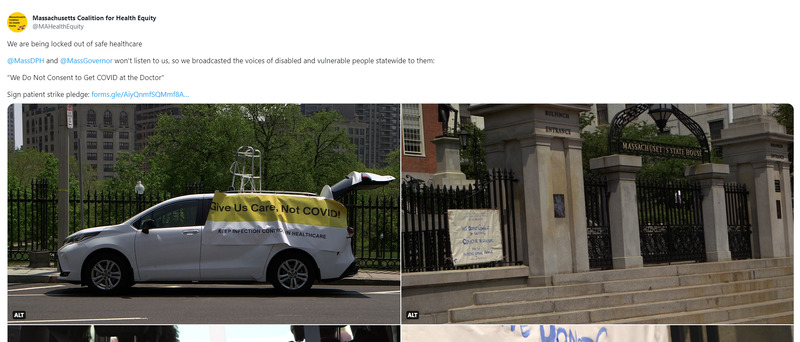 2023-05-14
2023-05-14Pandemics are Not "Great Equalizers" - Comparing COVID-19 to the Bubonic Plague Outbreak of 1870-1905
With the designation of COVID-19 as a "public health emergency" by the Centers for Disease Control and Prevention (CDC) ending as of May 11, 2023, public healthcare facilities throughout the US are rolling back protections they once employed to try to keep people safer during this ongoing pandemic. So, as this unit asks of us students, are pandemics the “great equalizers” in terms of social inequalities, and is there more equality now that the "emergency" has been deemed to be over? I argue that this is not the case, as immune compromised and disabled people have been more or less left for dead. A huge swath of healthcare facilities have removed mask mandates for care providers and hospital visitors, which leaves vulnerable and immune compromised people at a much higher risk of getting COVID-19 while receiving the medical care that is necessary for them to manage their conditions. In response, people and organizations, such as the Massachusetts Coalition for Health Equity in the tweet above, have begun to mobilize in favor of maintaining COVID-19 protections in healthcare settings by organizing strikes, protests, petitions, and phone banks to public officials. The reasons for maintaining COVID precuations such as mask mandates, access to COVID tests, and enhanced filtration in healthcare settings are clear. As the Massachusetts Coalition for Health Equity describes in their petition titled "Patient Strike Authorization Vote," the CDC "advises immunocompromised people to avoid crowded indoor settings, which now includes all healthcare institutions without universal masking," essentially maintaining that COVID is dangerous to immune compromised people while giving them no option but to risk exposure if they want to receive their necessary healthcare (Patient Strike Authorization Vote). The petition text explains that "[n]ational leaders in hospital epidemiology argue that universal masking should become the new standard of care, as gloves became with HIV" in order to keep people with compromised immune systems such as young children and elders safe (Patient Strike Authorization Vote). Currently, disabled and immune compromised people "are being locked out of safe healthcare" and are facing discrimination that makes them unwelcome and unsafe in healthcare settings (Massachusetts Coalition for Health Equity). In order to relate this modern COVID-19 pandemic to our course materials and demonstrate that discriminatory treatment during times of disease is not new, I will compare the above post to points from the text "The Chinese as Medical Scapegoats In San Francisco, 1870-1905" by Joan B. Trauner. This text discusses the discrimination against Chinese and other East Asian people living in San Francisco's Chinatown during a bubonic plague outbreak in the late nineteenth century. Sinophobic and anti-Asian sentiments, similar to those that arose during the epidemic Trauner details, have also been evident throughout the COVID-19 pandemic, so much so that even US President Donald Trump referred to COVID-19 as the "China virus." Ableism has also been prevalent throughout the COVID pandemic, as many people no longer care about the effects of the virus, because it harms disabled and immune compromised people most, especially people who also face racial discrimination in healthcare. Trauner explains that, because white people in the US believed the plague primarily affected Chinese and other Asian people, and because plagues were bad for business,"[t]he governor of California, Henry T. Gage, and executives of big business and of the large railroads, in conjunction with the San Francisco Board of Trade, the San Francisco Chamber of Commerce, and the Merchants Association, were all determined to prove that the plague did not exist in San Francisco" (78). The author of the Patient Strike Authorization Vote argues that today, we see a similar pro-business sentiment that comes at the expense of immune compromised people who are more likely to get sick with and die from COVID-19, writing: "Hospitals that remove masks and surveillance testing are making a value judgement about our lives, because they want to preserve their profit margins" (Patient Strike Authorization Vote). The CDC's ending of the COVID-19 public health emergency designation and the resulting halt of COVID mitigation procedures indicate that people are ignoring the needs of immune compromised people so that everyone can feel more comfortable going "back to normal" and maintaining consumption habits that are desired by businesses. Additionally, in both the past plague outbreak and the current pandemic, public health officials have shown hesitancy to give people vital information, which has led to harm. As Trauner explains, during the bubonic plague epidemic, "San Francisco Mayor Eugene Schmitz refused to approve the printing of health reports and vital statistics and even attempted to remove from office four members of the Board of Health who persisted in stating that plague existed in San Francisco" (79). Today, because the public health emergency designation ended on May 11th, 2023, the CDC is "no longer reporting aggregate cases and deaths, COVID-19 Community Levels, COVID-19 Community Transmission Levels, or COVID-19 Electronic Laboratory Reporting (CELR) data," all of which have been used to determine the severity of the situation throughout the pandemic (COVID Data Tracker). Meanwhile, over one thousand people are dying of COVID every single week, but COVID transmission levels are not being tracked, so people cannot know how many COVID positive cases there are in their county and how likely they are to contract the virus by going out in public (COVID Data Tracker). Another similarity between the COVID-19 pandemic and the bubonic plague outbreak of the late nineteenth century lies in the responses of the people facing discriminatory treatment in public health settings during these respective disease outbreaks. Trauner writes that before, during, and after the bubonic plague outbreak, Chinese businesses and health practitioners constructed and operated their own hospitals that would treat the people of Chinatown, because they were not welcome at other hospitals due to racial discrimination (81). Trauner explains that "[e]arly Chinese immigrants realized the necessity of banding together and providing for their own health care needs," in light of the government abandoning their health needs (81). Activists and organizations like the Massachusetts Coalition for Health Equity are currently banding together and fighting to get better and safer care for immune compromised people during the COVID-19 outbreak, as they are also facing discrimination at hospitals rolling back COVID precautions, because these spaces are not safe for them. The organizing they are doing to try to make healthcare settings safer for immune compromised people looks different, as no one is proposing the creation of immunocompromised-specific hospitals. They are fighting for better treatment, still, using slogans like "We Do Not Consent to Get COVID at the Doctor," and urging people that "[w]e must take collective action to prevent this mass violation of our human rights and federal rights to safe care," as stipulated under the Americans with Disabilities Act (Massachusetts Coalition for Health Equity). In both disease outbreaks, it has been the duty of those being discriminated against to take care of and advocate for themselves. So, in fact, pandemics are not "great equalizers"; in reality, they not only make pre-existing inequities even more visible, but exacerbate them even further. As Trauner argues, "Health policy [...] manifests not only the state of the medical sciences, but the expectations and the value system of society-at-large," and as such, if society-at-large is racist and ableist, then the health policies put into place will reflect these discriminatory values (70). These governmental measures come at a cost to everyone, and especially those facing racist and ableist discrimination. Had the nineteenth-century bubonic plague outbreak been determined an emergency and treated as a serious threat in spite of sinophobic and anti-Asian sentiments, perhaps more research could have been carried out sooner, and more lives could have been saved. If people in the US continue to take the COVID-19 pandemic seriously and not dismiss the pleas of immune compromised and disabled people to continue precautions, perhaps loss of life and further disablement from COVID infection can be mitigated. -
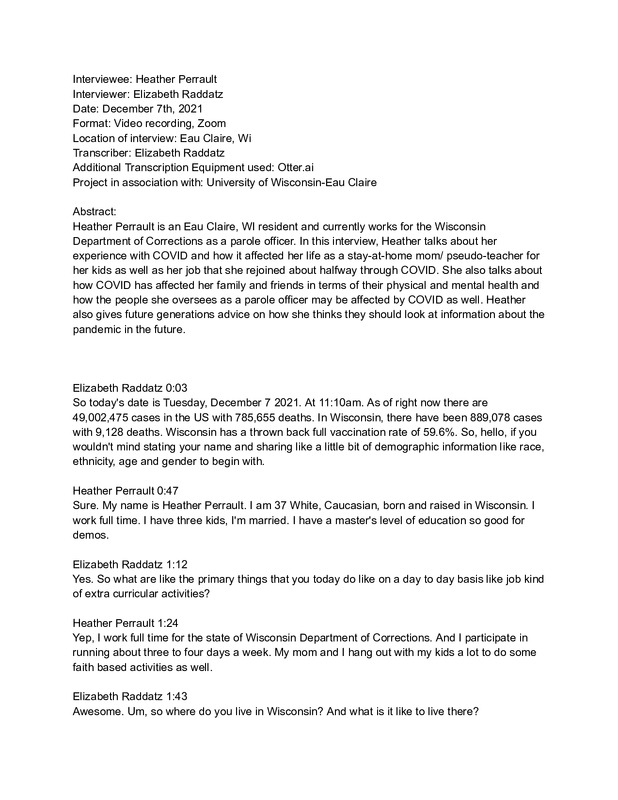 12/07/2021
12/07/2021Heather Perrault Oral History, 2021/12/07
Heather Perrault is an Eau Claire, WI resident and currently works for the Wisconsin Department of Corrections as a parole officer. In this interview, Heather talks about her experience with COVID and how it affected her life as a stay-at-home mom/ pseudo-teacher for her kids as well as her job that she rejoined about halfway through COVID. She also talks about how COVID has affected her family and friends in terms of their physical and mental health and how the people she oversees as a parole officer may be affected by COVID as well. Heather also gives future generations advice on how she thinks they should look at information about the pandemic in the future. -
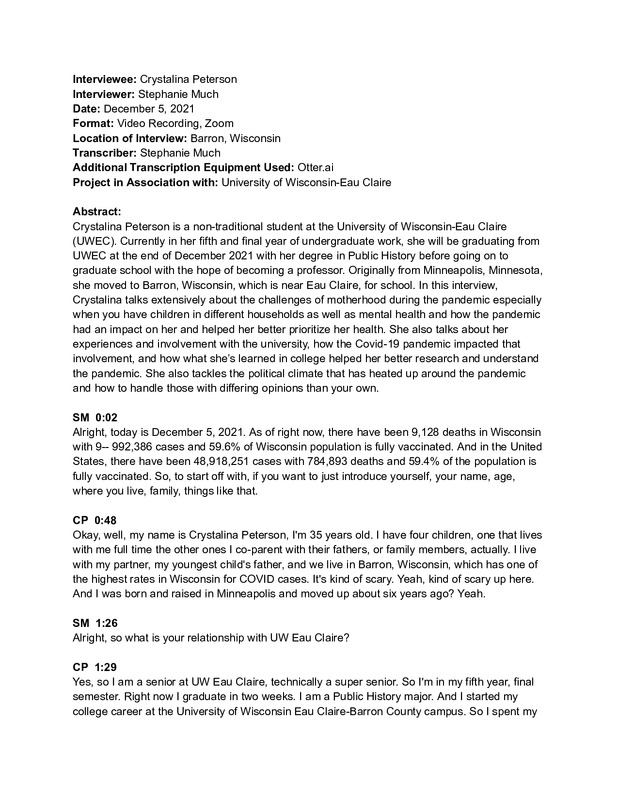 12/05/2021
12/05/2021Crystalina Peterson Oral History, 2021/12/05
Crystalina Peterson is a non-traditional University of Wisconsin-Eau Claire (UWEC) student. Currently, in her fifth and final year of undergraduate work, she will graduate from UWEC at the end of December 2021 with her degree in Public History before going on to graduate school with the hope of becoming a professor. Originally from Minneapolis, Minnesota, she moved to Barron, Wisconsin, near Eau Claire, for school. In this interview, Crystalina talks extensively about the challenges of motherhood during the pandemic especially when you have children in different households as well as mental health and how the pandemic had an impact on her and helped her better prioritize her health. She also talks about her experiences and involvement with the university, how the Covid-19 pandemic impacted that involvement, and how what she’s learned in college helped her better research and understand the pandemic. She also tackles the political climate that has heated up around the pandemic and how to handle those with differing opinions than your own. -
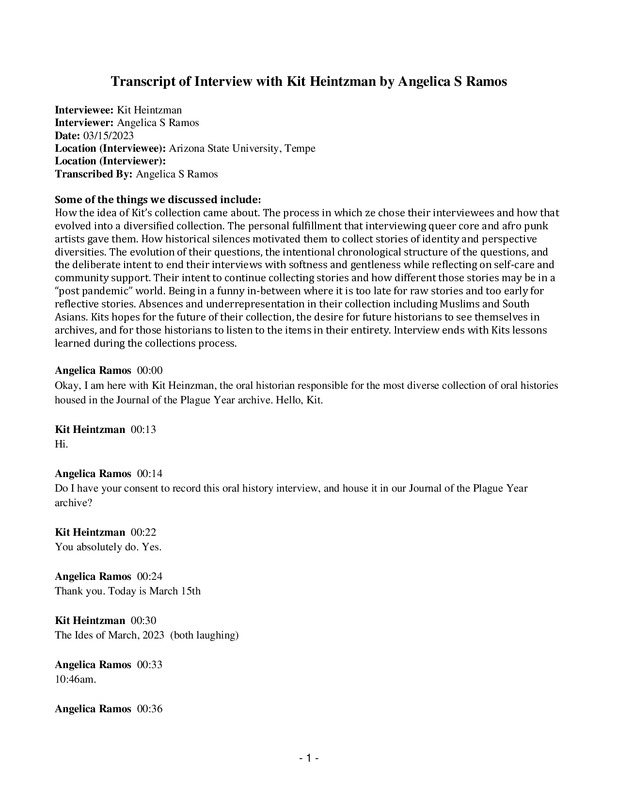 2023-03-15
2023-03-15Kit Heintzman Oral History, 2023/03/15
Kit Heintzman is a recovering academic currently residing in Lenapehoking, who was trained in the medical humanities with a special interest in queer theory, animals, and the history of nationalism. Kit has developed a singular collection of oral histories of the pandemic for A Journal of the Plague Year, collected from a range of individuals with widely diverse experiences. That collection addresses significant silences surrounding the pandemic broadly and within JOTPY more narrowly. In this item Kit is interviewed by Angelica and Erin, both with Arizona State University, about Kits collection process. -
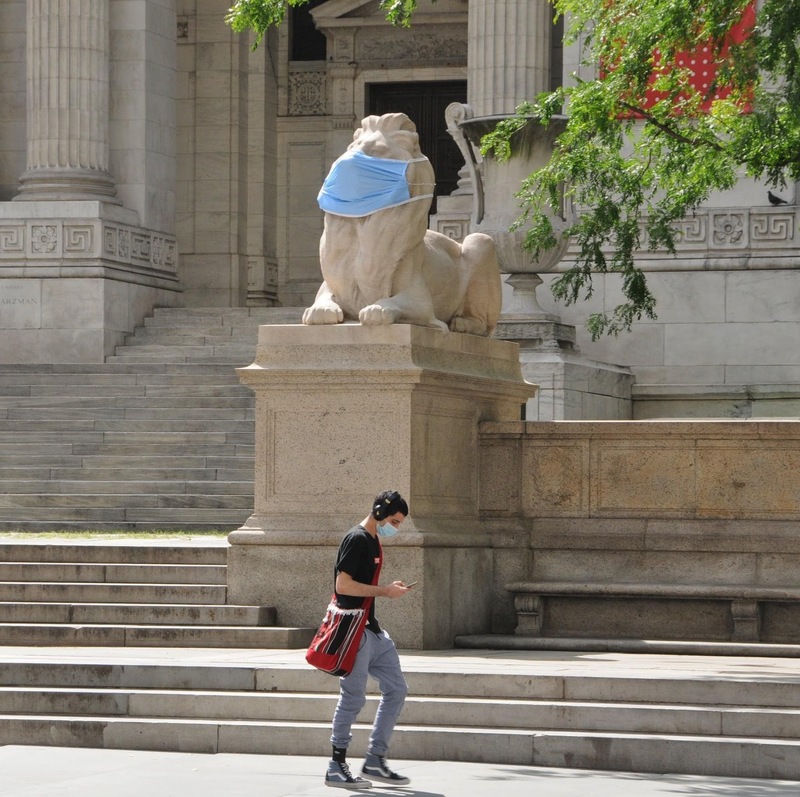 2020-07-27
2020-07-27Patience and Fortitude
The New York Public Library’s website explains, “During the 1930s, Mayor Fiorello LaGuardia named [the library lions] Patience and Fortitude for the qualities New Yorkers would need to survive the economic depression.” I remembered this fact and connected immediately with it the first time I saw Patience and Fortitude wearing their masks in solidarity with the New Yorkers they have watched over for more than a century. It struck me that we would need those virtues to make it through COVID-19 as well. “Those lion statues have seen New York struggle through and overcome many hardships from the 1917 Flu to the Great Depression to September 11th,” I thought. Things were grim in New York in 2020. We were the first to experience the horror that would eventually engulf the whole country. The infection rate was high, hospitals were full, people were dying. It was easy to despair. The masked lions were a powerful symbol of the resolve and resilience of New Yorkers and a reminder that this turmoil, too, would pass into history and the city - like the lions - would remain standing. -
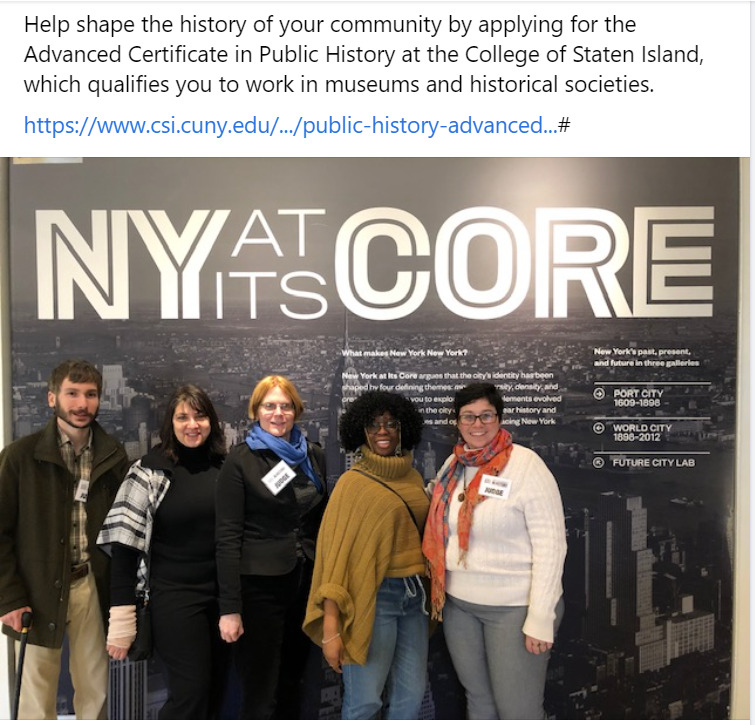 2020-06-17
2020-06-17NY at its Core
Help shape the history of your community by applying for the Advanced Certificate in Public History at the College of Staten Island, which qualifies you to work in museums and historical societies. -
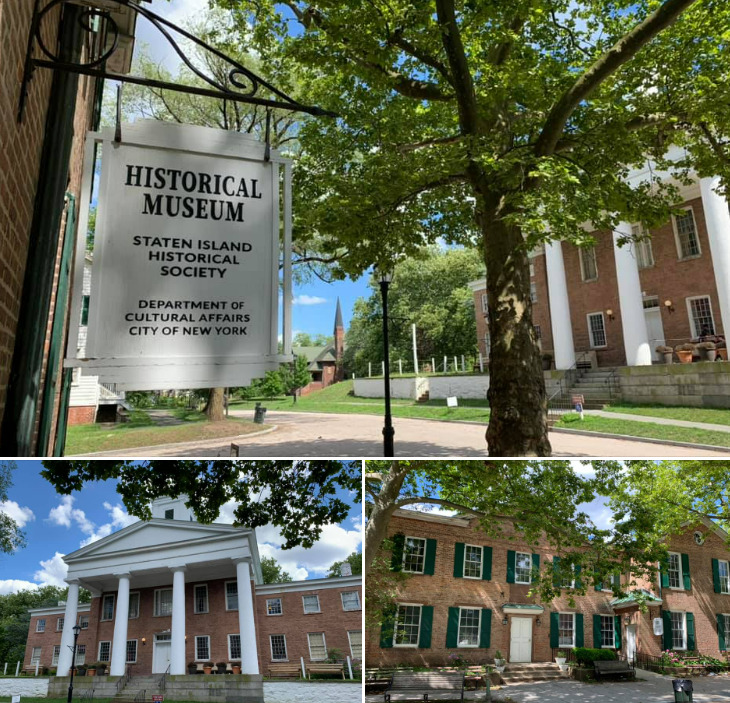 July 22, 2020
July 22, 2020A nice walk through Historic Richmond town.
A nice walk through Historic Richmond town. -
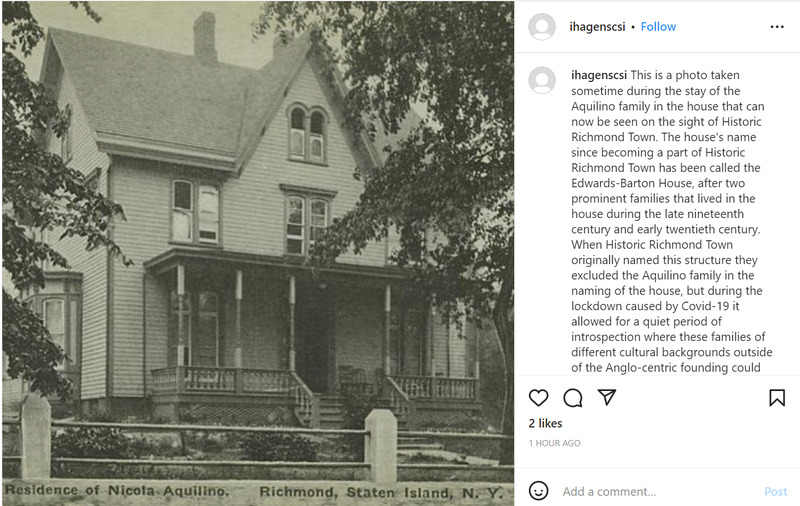 2023-02-28
2023-02-28Aquilino House
This is a photo taken sometime during the stay of the Aquilino family in the house that can now be seen on the sight of Historic Richmond Town. The house's name since becoming a part of Historic Richmond Town has been called the Edwards-Barton House, after two prominent families that lived in the house during the late nineteenth century and early twentieth century. When Historic Richmond Town originally named this structure they excluded the Aquilino family in the naming of the house, but during the lockdown caused by Covid-19 it allowed for a quiet period of introspection where these families of different cultural backgrounds outside of the Anglo-centric founding could be honored. Staten Island is a very diverse place and the institutions that operate on its soil should reflect that aspect. Photo credit goes to New York Public Library. -
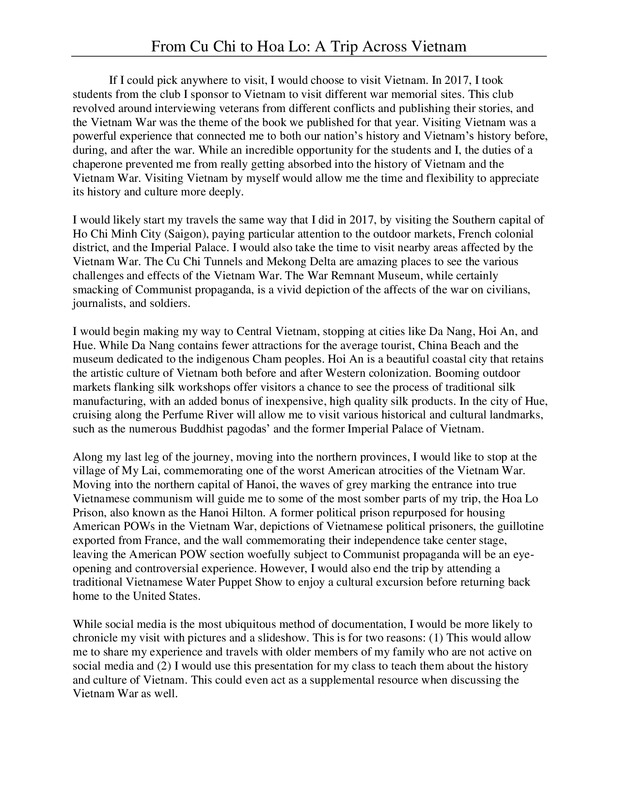 2018-03-11
2018-03-11From Cu Chi to Hoa Lo
Travel to Vietnam is seeing increased tourism in the post-COVID world, so while restrictions have dropped, certain destinations that have been included, such as the Cu Chi tunnels or the War Remnants Museum, which typically are densely packed, may have included changes to improve public safety and health. -
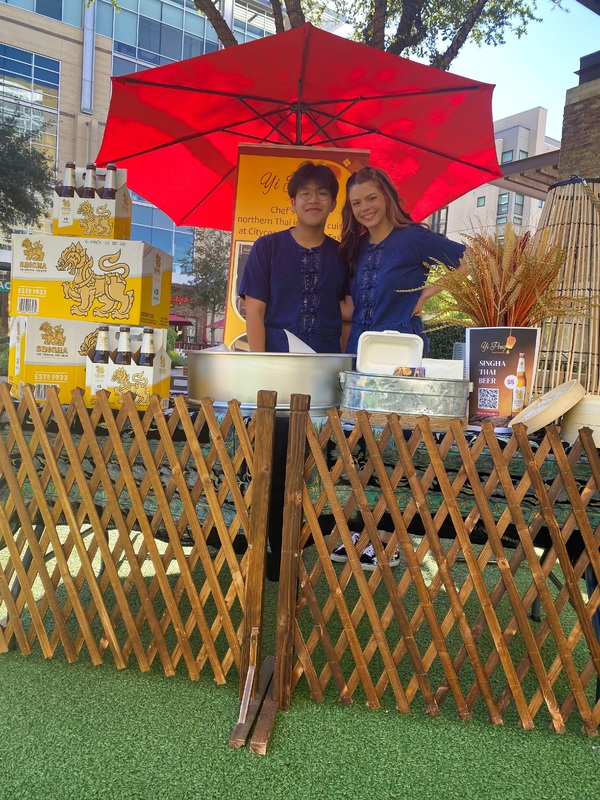 2022-10-01
2022-10-01Chan Yak Ja Pbai (I Want To Leave)
Unfortunately, I have not been able to travel since the COVID-19 restrictions were lifted. The last two years of my undergraduate were affected by the pandemic, and initially, I was planning to study abroad during my senior year. Unfortunately, that was not possible and I was barely able to complete my student teaching placement for my Secondary Education Minor as the program was constantly under revision to ensure student safety. Now, as a graduate student, if I could go anywhere it would easily be Thailand as that is where my personal historical focus is. While my Thai is far from fluent, I have been steadily learning the language for about a year now as I hope to have an opportunity to complete an extended stay for scholarly or leisurely purposes. In terms of specifics, I would first like to travel to Chiang Rai, Sukhothai, or across Isan as Northern and Eastern Thailand have some of the richest historical and cultural sites, combined with the fact that individuals who I am very close to are from these areas as well. I have worked part-time at a Thai restaurant in Houston for a significant amount of time which helps considerably with practicing the language. As I am one of the only foreigners that works for the restaurant, the owners, my co-workers, and the individuals I have been introduced to through them have become like a second family to me, and I am very grateful for their generosity, inclusivity, and willingness to teach me as an outsider to the culture. Thus, I would love to be able to visit the areas that have meaning to them as well as fulfill my own historical ambitions. Two of my closest co-workers and I discussed traveling to Thailand and Laos together, and we agreed it would be interesting if we started a vlog to document the process. Not every temple or historical landmark allows photography or video to be taken, but I do think a vlog would be a great way to capture the moment as I am not the best at actively documenting things through social media. Video documentation also has the advantage of directly capturing the emotions and excitement of traveling as opposed to journaling or even photography. The photo I chose is of my co-worker and me at an event for the restaurant promoting Northern Thai cuisine in the traditional "Mo Hom", or the shirts worn by rice farmers. -
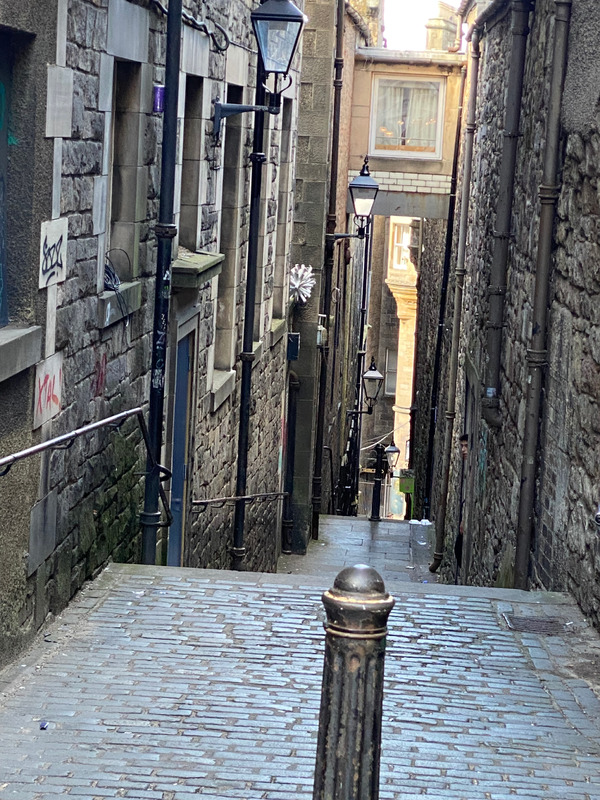 2021-04-18
2021-04-18Edinburgh and Northumberland, "Post Pandemic" Historical Tourism
I had been dreaming of this trip since 1996 when I went to England on a high school theatre and literature trip and fell in love with the UK. Specifically, I fell in love with Scotland and its history, becoming a British History enthusiast. In August, 2021, I completed my BA in History at ASU, then changed careers from Film/tv costuming to a special education teaching position. During the peak age of Covid-19, I worked full time, completed full time undergraduate studies, interned in politics and not-for-profit law, and started over in a new career and life in a new state. All of 2020-2021 was a non-stop adrenaline rush of constantly moving, getting Covid, and burning out mentally along the way. In 2021, I was halfway through a teaching contract and gravely unhappy, longing to just... escape. I kept dreaming of one photo of Edinburgh that was on my vision board. The picture, from Pinterest, was of a narrow Close in Old Town, Edinburgh, the historic "original" city that squeezed so much history and magic in about a mile. Old Edinburgh held tens of thousands of people in one square mile with their Closes serving as narrow alleyways between buildings of both stone and wood, both affluent and poor societal classes. After creating this vision board, I started working a ridiculous amount of overtime in the school's residences for special needs students and saving money. I was used to already working over 60 hours a week, so I didn't see the problem yet. The short staffing crisis of special education staff provided the opportunity to earn $40/ hour plus $1000 monthly bonus for anyone willing to work and be okay with less support for challenging behavior or emergency resources. I was willing to work hard to be free for just a short time over the Easter/Passover School break. Flight and accommodation prices were incredibly low at the start of 2021, encouraging tourists to travel. British Airways and other airlines offered incredible fares! These discounts still enabled me to book more affordable fare into 2023. My flight from Boston to Edinburgh was just over $400, with 7 nights stay in two 4 and 5 star hotels plus one castle for a total of less than $1000. My dream trip was planned to every detail and paid in advance or booked for free with historical memberships. The pandemic and rising popularity of Airbnb and Verbo created the perfect discounts for hotels and upgrades to better suites. Pre-pandemic, I got bed bugs from an Airbnb and had a nightmare of an experience, so it was out of the question for accomodation moving forward. While in planning stages, I booked historical tours and entry into sites like Edinburgh Castle, Mary Kings Close, Ghost Tours of the Vaults, Sterling Castle, then in England, Alnwick Castle and Chillingham Castle's paranormal investigation. I already had memberships to multiple British historical and public sites like the Alnwick Gardens (site of the famous Poison Garden) and Historical Scotland. From Edinburgh Castle to Chillingham Castle, I finally got to see the gallows, dungeons, and artifacts that were in my undergraduate classes. Finances and waiting for a travel companion to finally find "the time" to go held me back from going previously, but I was there, alone, at this particular time for a reason. I got to hold Witches Collars and touch an Iron Maiden that tortured so many innocent "witches". I sat in castle common areas alone with a glass of Whisky and venison sausage while hunting ghosts. Museum staff showed me witches charms and introduced me to folklore that secretly told tales of history in starkly lit archival research rooms. It was this trip that solidified by decision to continue onto graduate studies in history at ASU. It was this trip that made me question, "Why are we so fascinated by death and folklore?" It would be remiss to mention that during my historical tourism of Edinburgh and the Scottish-English Borderlands, the stories of historically significant pandemics and major moments of medical and scientific struggle or discovery were always present- It was..."everything, everywhere, all at once", if you will. The comparisons between Black Death to Cholera to Spanish Flu were ever-present while exploring Mary Kings Close, places of Surgical and Medical History interest, The Vaults, the Grass Market Gallows. I stepped into a cramped spaces that were once the homes of a families who all died of The Plague. White rags hung out the windows of these tourist destinations to remind visitors that it was the way leather beak masked Plague Doctors identified the infected and quarantined. "Haunted" Vaults served as reminders to modern tourists that the poor and disenfranchised once stayed here. If you want to go anywhere in the world to see a pandemic being held with an engrained fear and solemn respect for medical research, it's Scotland. In England, Chillingham Castle and Alnwick Castle allow visitors close proximity to places where prisoners carved each imprisoned day before their deaths into the walls. In Edinbugh, if it isn't a Harry Potter tour, it is a ghost tour. These ghosts are explored with light-hearted entertainment or found during paranormal investigations with high-tech gizmos and Ouiji Boards in this new age when we don't want to talk about how many people died of Covid-19 or a lack of health resources, but pre-modern history when people don't currently hold memory of the dead... One late morning, I went to a pub on the Royal Mile for a proper Scottish breakfast of sausages, haggis, bacon, eggs, tomato, and toast... and a pint. Bagpipes echoed in the air, passers-by spoke different languages and carried their cameras and I (Heart) Scotland t shirts and Whisky. As I sat outside, just taking everything in, a group of domestic tourists sat at my table. We laughed because we were all uncertain of "Mask? no Mask? What does 'optional Mask mean?' Were we bad people for NOT wearing a mask inside the pub to get another beer?" "Is it appropriate to sit so 'close'?" That particular day was the lifting of the Scottish masks in public places mandate. My mates-for-the-day spoke of their quarantines and experiences with Covid-19 and quarantine with both humor and sombre memories. The photo attached to this story was from this day where masks were no longer a must. It is also the same scene from my vision board. On my camera and iPhone camera reels, before this moment and after are dozens of photos of castle chambers, countryside fog, tourist photo ops of High Tea or plain ol Costa Coffee at [Insert Tourist Destination]. My photos are visited with gratitude and inspiration. Not only do I have a renewed desire to travel, but I have a spark of motivation to keep learning. I would never have been able to afford this trip at the level of luxury and privilege I experienced it without the Covid-19 pandemic's aftermath of needed promotional discounts. Misery was everywhere, yes, but joy and purpose were found for me. I hope there were others that experienced incredible change and revelation during this time. -
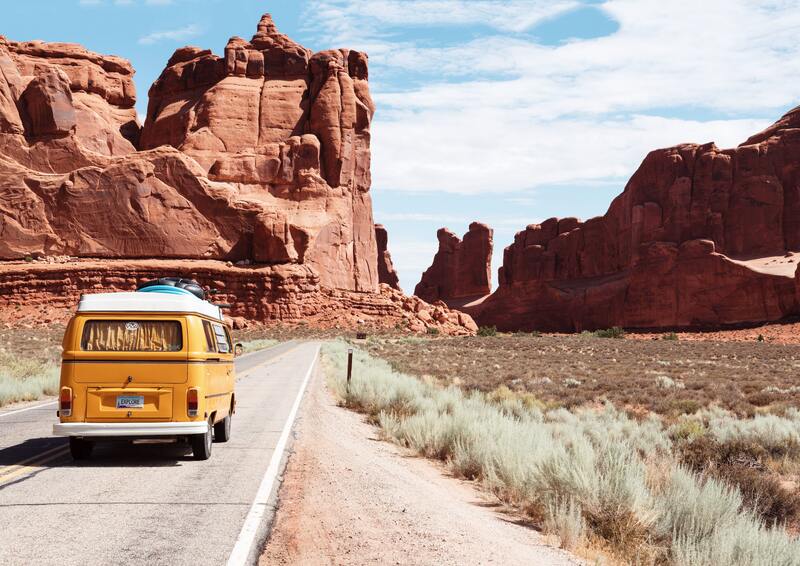 2023-02
2023-02Tourism story for the COVID-19 Archive
Worldwide, nations implemented social distancing and disease mitigation strategies in the Spring of 2020. These policies varied widely, but many places experienced restrictions on personal movement and travel. For your submission, respond to the following prompt: When travel restrictions were lifted, did you take a trip? If so, where did you go and why? What are your memories of this trip? Were there any continuing COVID-19 restrictions in place? If you did not travel and have still not traveled, answer the following question: If you could travel anywhere, where would you go and why? What destinations would you be sure to see? How would you document your trip (journal, social media, etc.)? How and What to Submit: For this assignment, you'll submit one item that captures a travel memory that relates to the COVID-19 pandemic. You'll submit your item to the COVID-19 Archive Links to an external site.on the "Share your Story Page." Include the following metadata (information): The title The description (this is the most important part. Tags: at a minimum (Arizona State University, HST 643, and History of Tourism). Feel free to add your own additional tags. Type: Audio recording, photograph, video, text story, recipe, etc. Date (When did this story happen) Contributor (your name) Location (where did/does this memory take place). What to submit: Submit your story to the archive Submit the title of your story on Canvas and the date you submitted it. This will help me find it in the archive. -
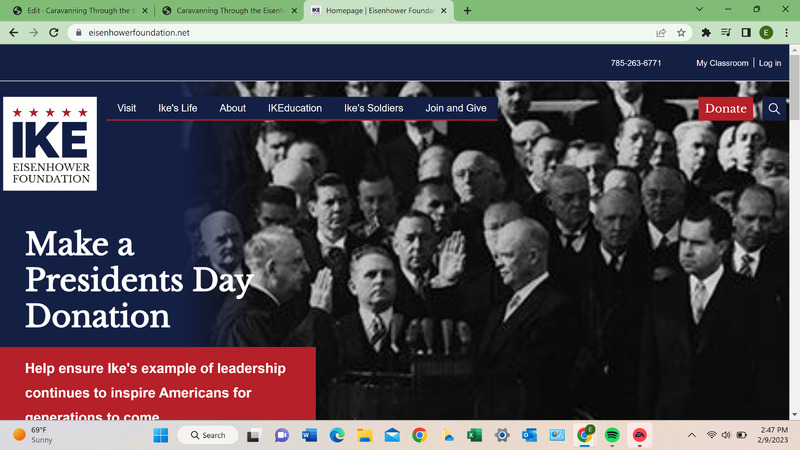 2020-10-17
2020-10-17Caravanning Through the Eisenhower Gala
I try to attend the Eisenhower Gala every year. It is scheduled for the Saturday nearest to Dwight D. Eisenhower’s birthday. During the first year of the corona lockdown, in 2020, we got together to celebrate Ike’s birthday without the Gala. We caravanned around Abilene to different places of significance in young Dwight’s life with Mary Jean Eisenhower, Dwight D. Eisenhower’s granddaughter explaining the significant place to Ike’s life. We went to the fairgrounds where Ike announced his candidacy for President. We went to a historical building where Dwight and Mamie Eisenhower watched a parade to honor him. The building is now apartments for folks of modest means that, somehow, seems fitting. I’m confident Ike wished everyone well and to be happy. We went to the cemetery where Dwight’s father, Jacob, and mother, Ida, were buried. I was struck by how modest the graves were. I thought Eisenhower’s lived modestly like us. The tour finished at Ike’s favorite restaurant in Abilene, the Farmhouse Restaurant, where we had an excellent dinner. Though there was no Gala dinner with elegantly clad ladies and gentlemen enthusiastically lost in gregarious conversation, I thoroughly enjoyed visiting all the historical places of significance in young Ike’s life. The 2020 Eisenhower birthday celebration was once educational and engaging. -
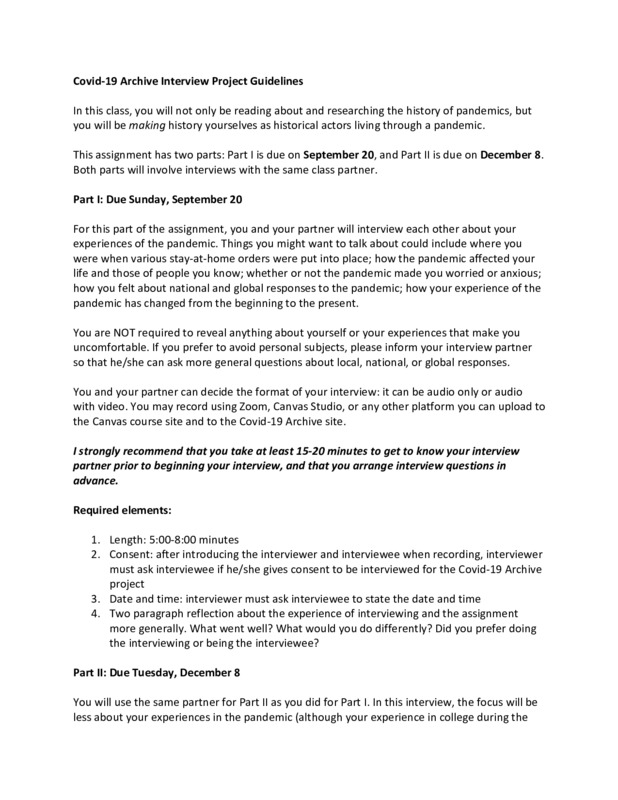 2020-09-20
2020-09-20Northeastern University HIST 1219 Assignment Prompt
This assignment was given to students in Northeastern University's HIST 1219, History of Global Pandemics, taught by Dr. Streets-Salter in Fall 2020, and then taught by a graduate student in Fall 2021. -
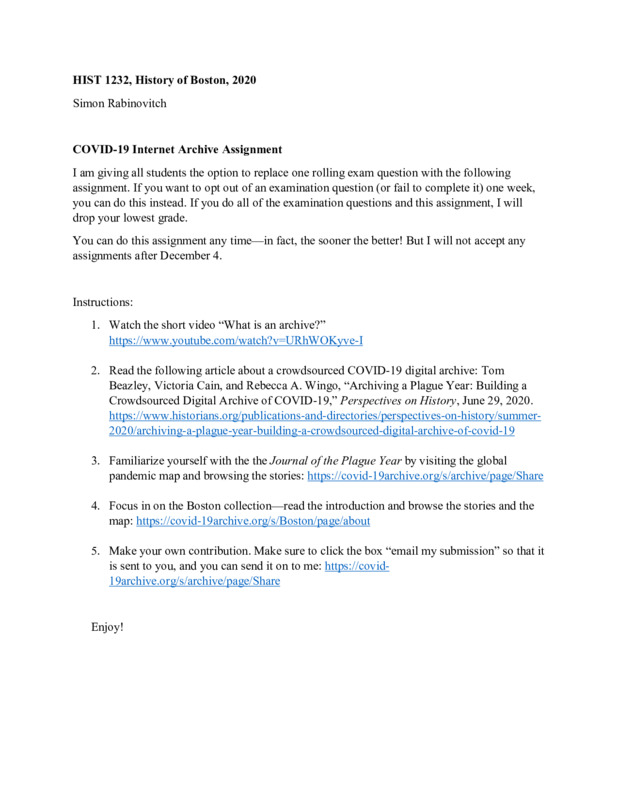 2020-12-04
2020-12-04Northeastern University HIST 1323 Optional Assignment Prompt
This is an optional assignment given to students in Northeastern University HIST 1323, History of Boston, taught by Dr. Rabinovitch in Fall 2020. -
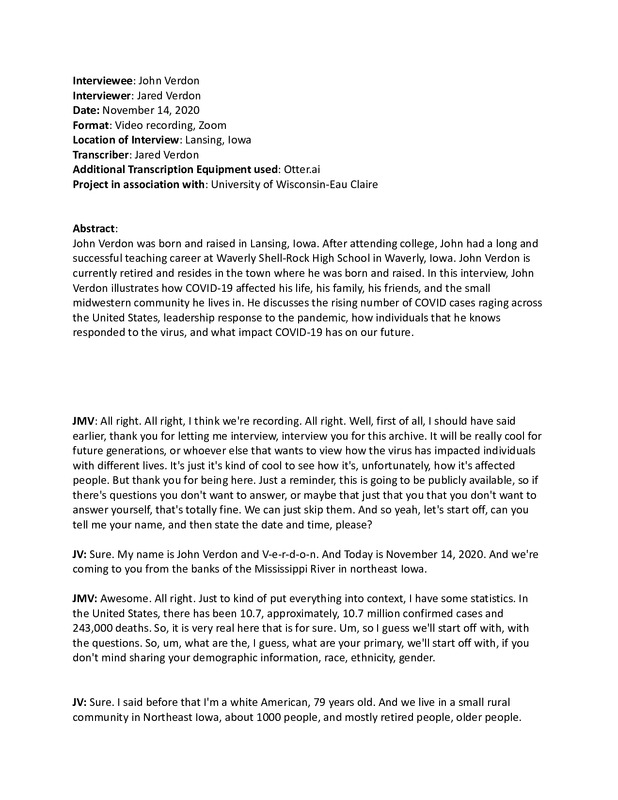 11/20/2020
11/20/2020John Verdon Oral History, 2020/11/20
John Verdon was born and raised in Lansing, Iowa. After attending college, John had a long and successful teaching career at Waverly Shell-Rock High School in Waverly, Iowa. John Verdon is currently retired and resides in the town where he was born and raised. In this interview, John Verdon illustrates how COVID-19 affected his life, his family, his friends, and the small midwestern community he lives in. He discusses the rising number of COVID cases raging across the United States, leadership response to the pandemic, how individuals that he knows responded to the virus, and what impact COVID-19 has on our future. -
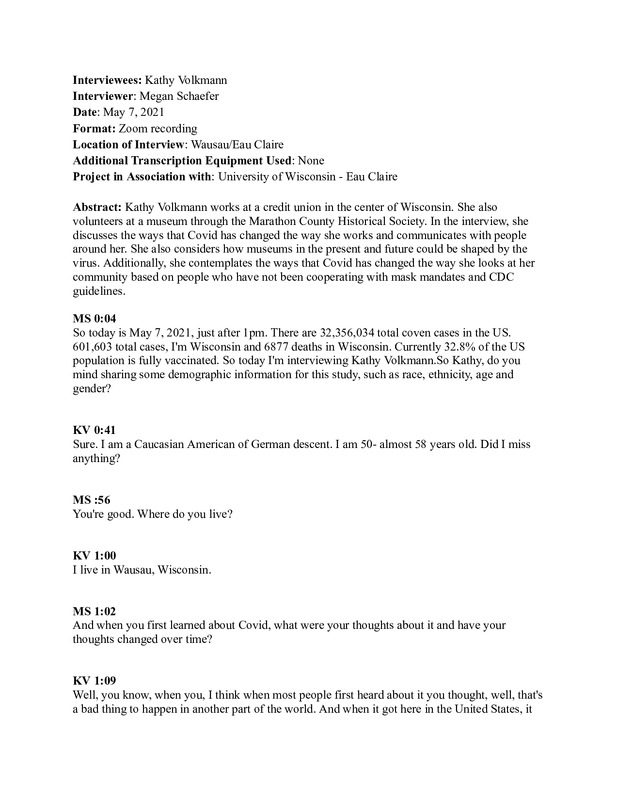 05/07/2021
05/07/2021Kathy Volkmann Oral History, 2021/05/07
Kathy Volkmann works at a credit union in the center of Wisconsin. She also volunteers at a museum through the Marathon County Historical Society. In the interview, she discusses the ways that Covid has changed the way she works and communicates with people around her. She also considers how museums in the present and future could be shaped by the virus. Additionally, she contemplates the ways that Covid has changed the way she looks at her community based on people who have not been cooperating with mask mandates and CDC guidelines. -
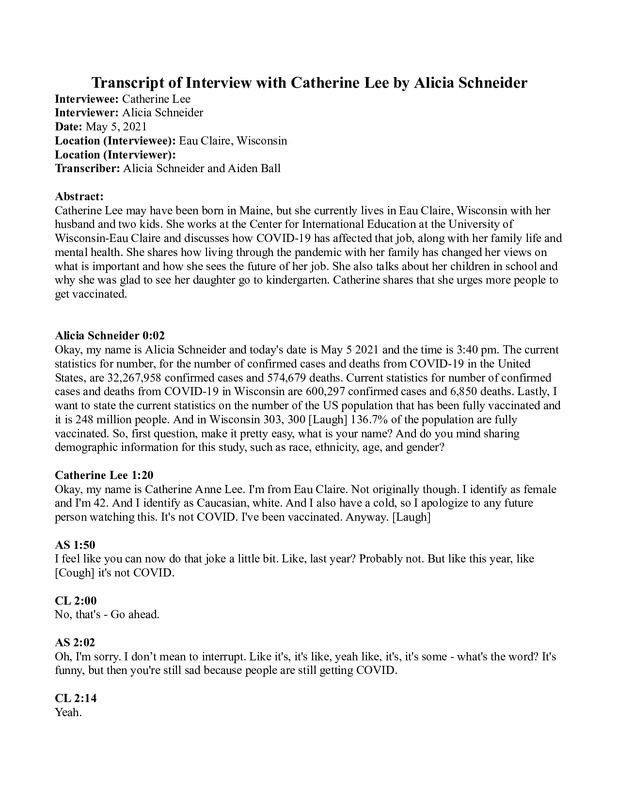 05/05/2021
05/05/2021Catherine Lee Oral History, 2021/05/05
Catherine Lee may have been born in Maine, but she currently lives in Eau Claire, Wisconsin with her husband and two kids. She works at the Center for International Education at the University of Wisconsin-Eau Claire and discusses how COVID-19 has affected that job, along with her family life and mental health. She shares how living through the pandemic with her family has changed her views on what is important and how she sees the future of her job. She also talks about her children in school and why she was glad to see her daughter go to kindergarten. Catherine shares that she urges more people to get vaccinated. -
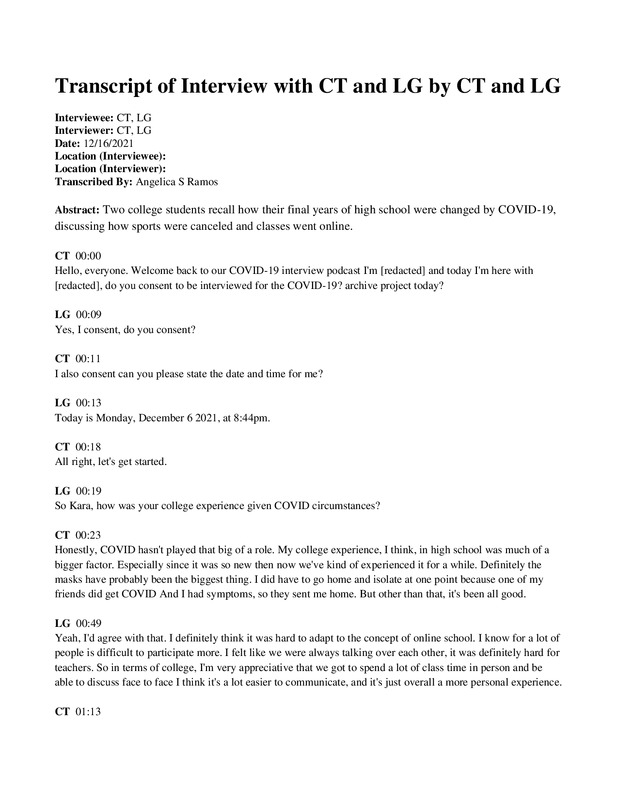 2021-12-16
2021-12-16CT and LG Oral History, 2021/12/16
This is the second part of a podcast by two college students. In this part they discuss the similarities they have found in how they experienced COVID and what they learned about past pandemics. -
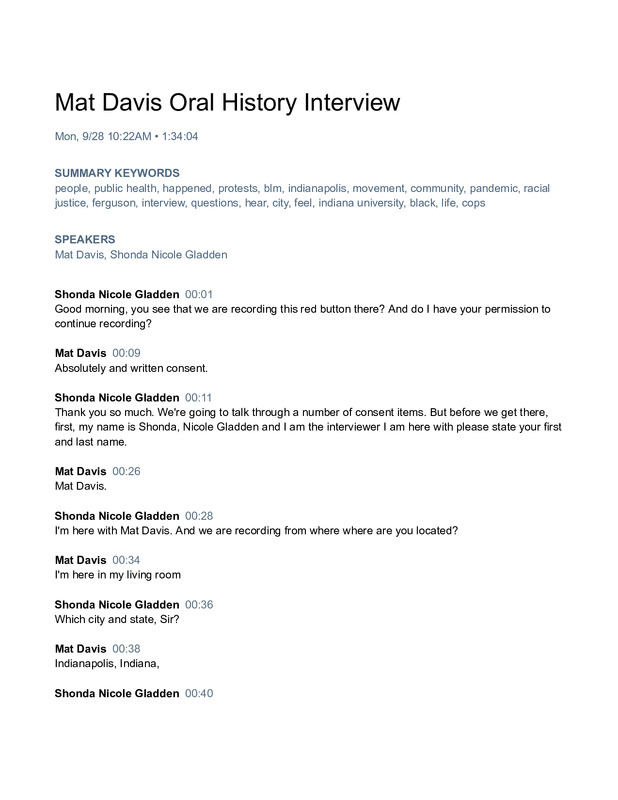 09/25/2020
09/25/2020Mat Davis Oral History, 2020/09/25
C19OH -
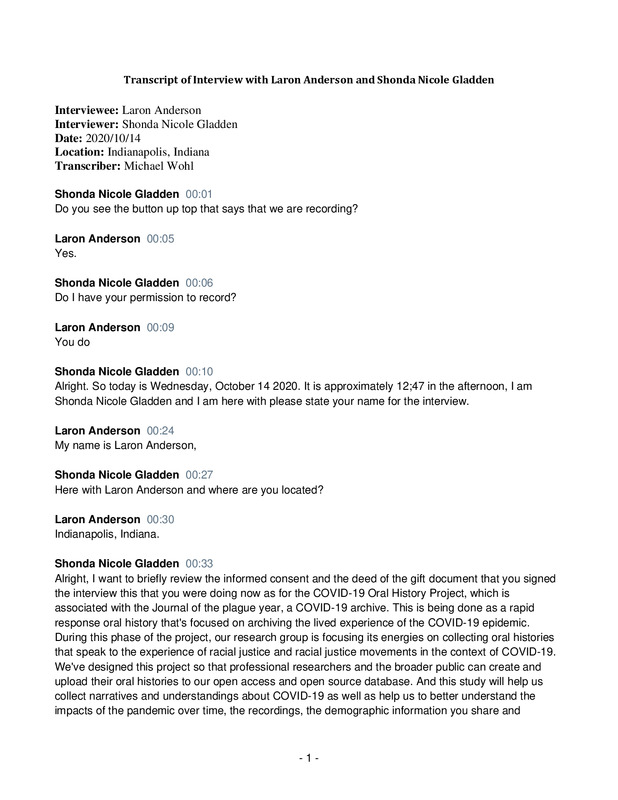 10/14/2020
10/14/2020Laron Anderson Oral History, 2020/10/14
-
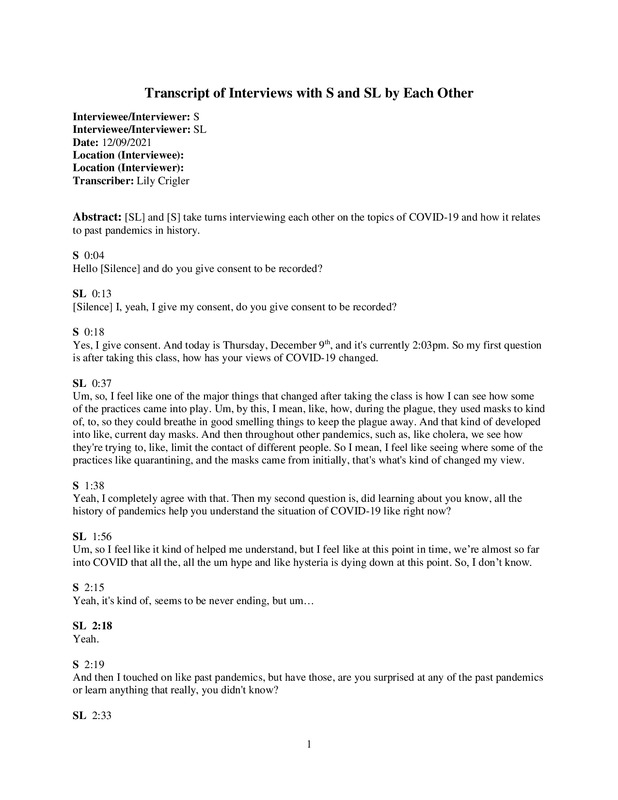 12/09/2021
12/09/2021SL and S Oral History, 2021/12/09
[SL] and [S] (Last name unknown) take turns interviewing each other on the topics of covid-19 and how it relates to past pandemics in history. -
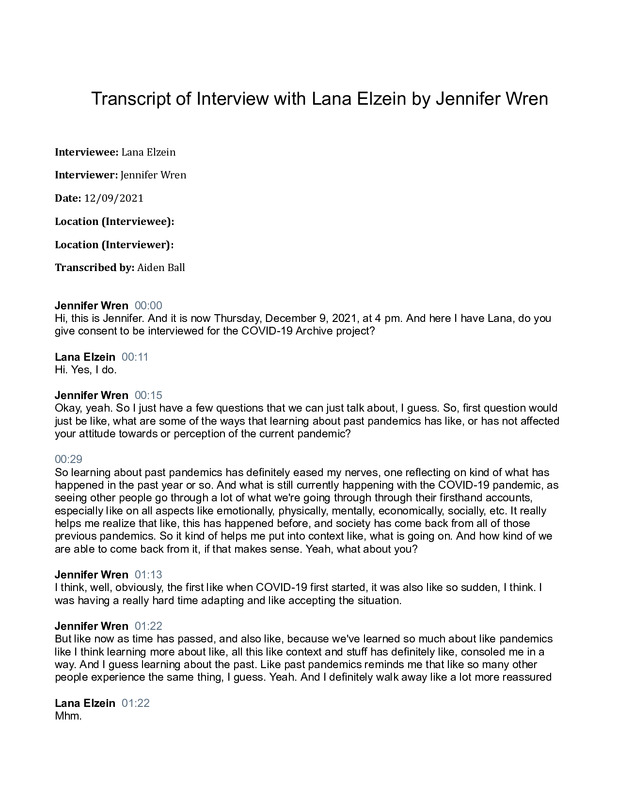 2021-12-09
2021-12-09Lana Elzein Oral History, 2021/12/09
This story is an update to our first post where we talk about how learning about previous pandemics in our college course History of Global Pandemics has provided insight and consoled us as we experience the current Covid-19 pandemic. -
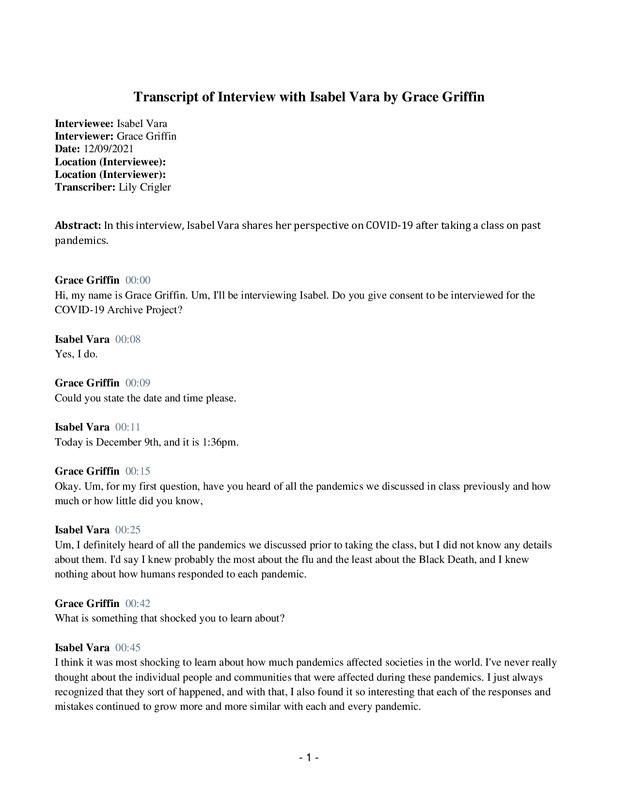 2021-12-09
2021-12-09Isabel Vara and Grace Griffin Oral History, 2021/12/09
The audios I have uploaded share different perspectives on Covid-19 after learning about past pandemics -
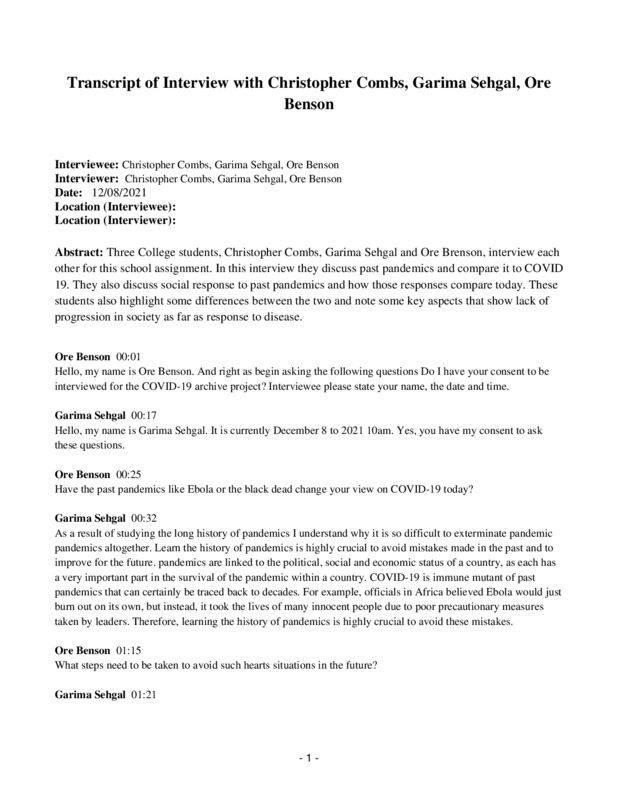 2021-12-08
2021-12-08Christopher Combs, Garima Sehgal, Ore Benson Oral History, 2021/12/08
This podcast covers the ways that learning about past pandemics has affected our attitude toward, or perception of, the current pandemic. -
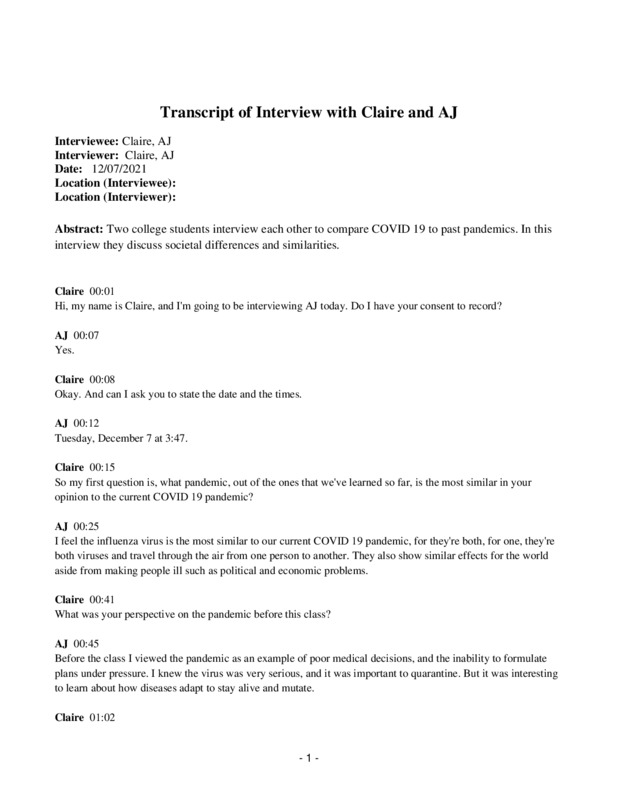 2021-12-07
2021-12-07Claire and AJ Oral History, 2021/12/07
We took a class about global pandemics, and we are explaining how our perspectives on pandemics have changed. -
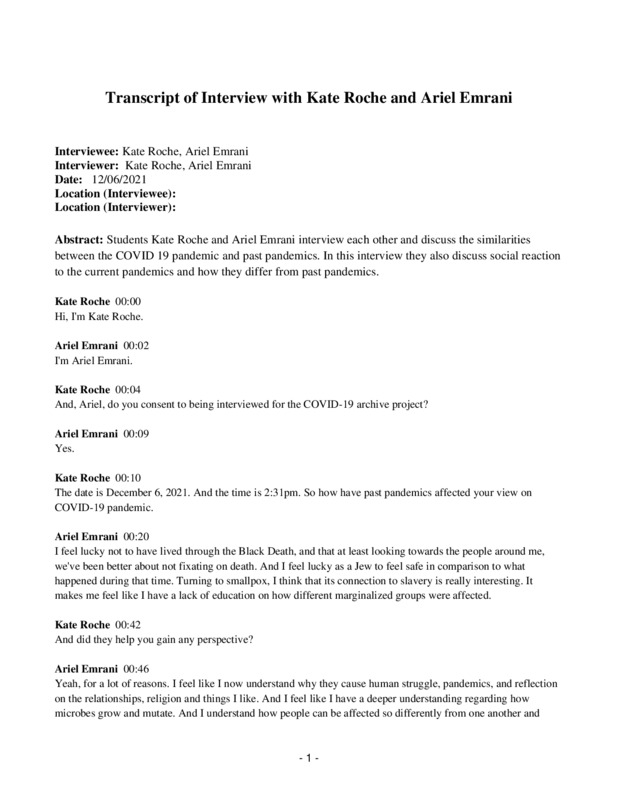 2021-12-06
2021-12-06Kate Roche and Ariel Emrani Oral History, 2021/12/06
It explains how past pandemics have affected how we view COVID-19. -
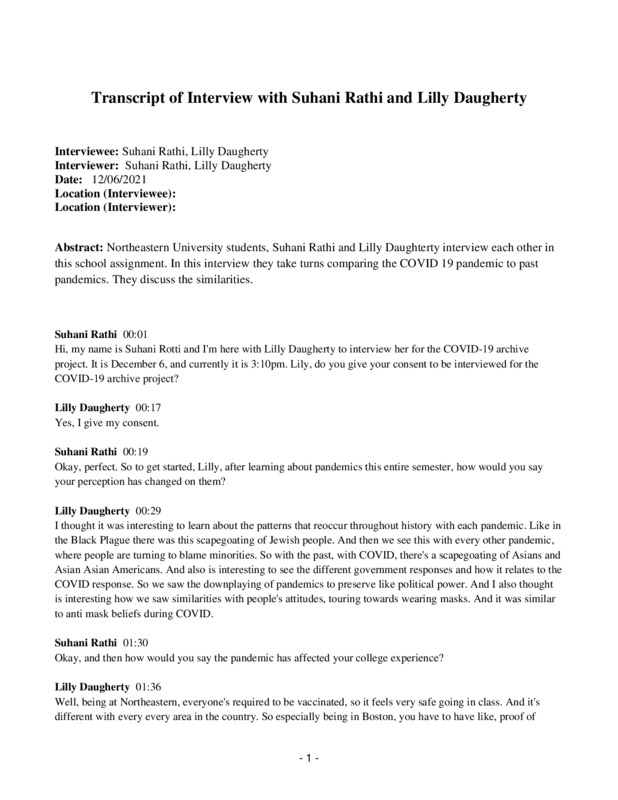 2021-12-06
2021-12-06Suhani Rathi and Lilly Daugherty Oral History, 2021/12/06
Northeastern University students, Suhani Rathi and Lilly Daughterty interview each other in this school assignment. In this interview they take turns comparing the COVID 19 pandemic to past pandemics. They discuss the similarities. -
 2021-12-03
2021-12-03Juliana Marston and Sydney Champagne Oral History, 2021/12/03
We are both students in college. In our History of Pandemics class, we learned about past pandemics (namely the Bubonic Plague, Smallpox, Cholera, and Influenza pandemics) and how they impacted society. This course also challenged us to compare and contrast the current pandemic to those of the past, while considering how mankind may fare in pandemics moving forward. We discuss these things and more in the interview recording. -
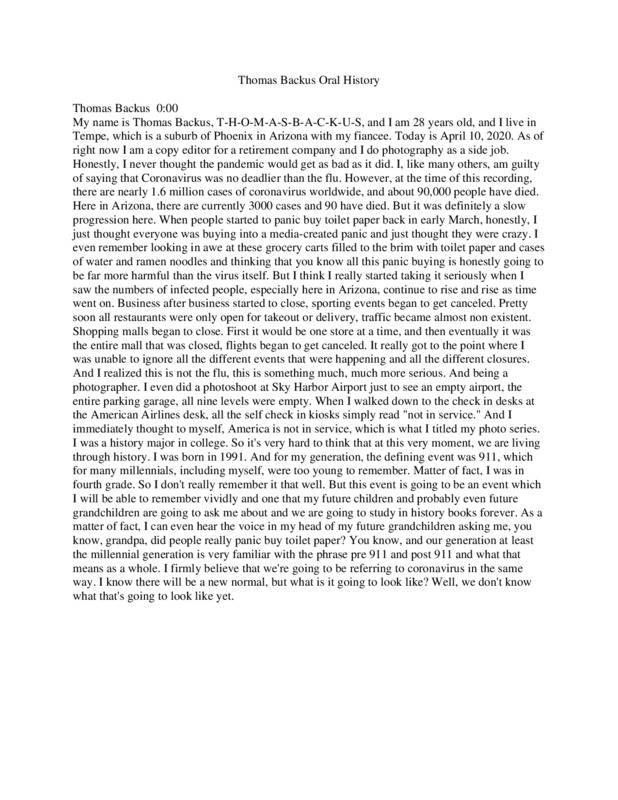 04/10/2020
04/10/2020Thomas Backus Oral History, 2020/04/10
Thomas Backus of Tempe Arizona reflects on what life was like when the COVID 19 hit and how it impacted his life. -
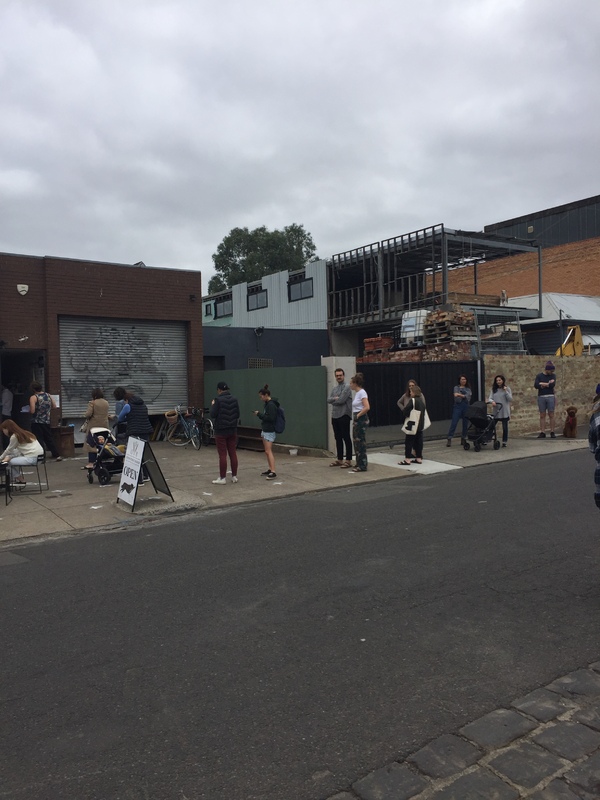 2020-03-21
2020-03-21Bakery queue March 2020 HIST30060
In March 2020 during the first covid-19 lockdown, we heard a lot about toilet paper shortages, queues and fights for it at supermarkets. What surprised me to see on a walk around Brunswick was a substantial queue at a local bakery. It was also one of the first social distanced queues I had seen and certainly the first I had taken a photo of. It summed up the new state of affairs to me, while reminding me of the importance that bread holds in our diets. In some ways I was relieved to see a queue for it rather than something more trivial such as toilet paper. The fact it was a local bakery highlighted to me the importance that people in Brunswick place on locally made produce. This also reminded me of the historical importance of bread, for instance the riots that occurred when bread and flour prices increased in France in the late 1780s or Lenin's promise to the Russian people of 'Peace, Bread, Land' in 1917. To me this photo captured how despite circumstances changing immensely, the importance of accessing staple foods remains more or less constant. -
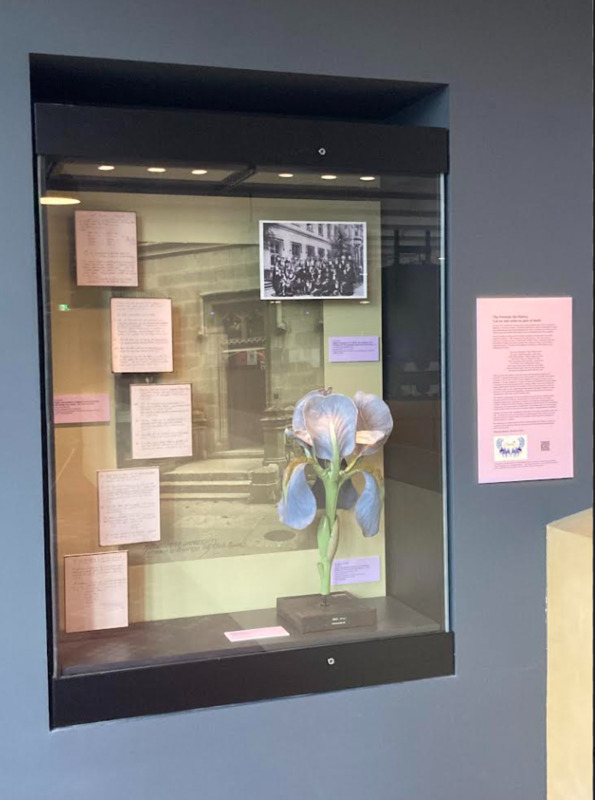 2021-07-29
2021-07-29(HIST30060) An Exhibition I Created at University
After a year as subeditor, I was lucky enough to be appointed the 2021 editor of Chariot, the undergraduate history journal at the University of Melbourne. As an initiative to raise student engagement and make history more interesting, I worked with the university staff and one of our previous contributors of the journal in turning her essay into an exhibition in the university's Arts West building. Unfortunately, due to the lockdown, I was unable to see the exhibition in person myself, but the experience of putting it together from start to finish was a hugely rewarding one. -
 2021-10-09
2021-10-09The Challenges of Performing Arts During the Pandemic
This is a short audio file that talks about what challenges I faced during the pandemic, including a performing arts that was shut down the day before opening night and then a successful fundraiser that raised $25,000. -
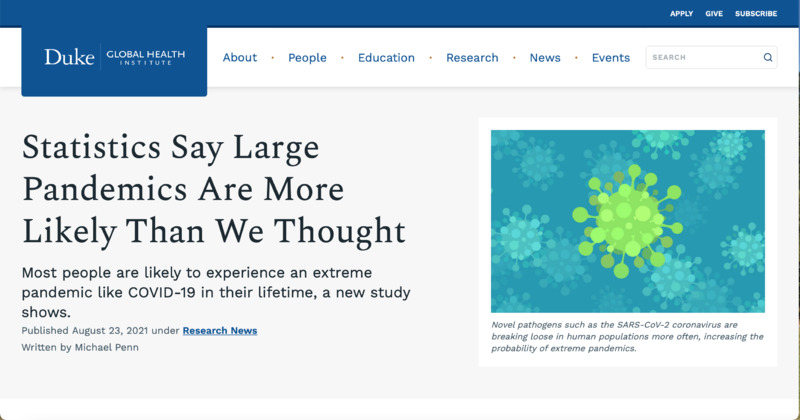 2021-08-23
2021-08-23Just when you thought it was safe...
This is an article from Duke Global Health Institute that theorizes that pandemics such as the one we are in now, are actually relatively common and most people are likely to experience one in their lifetime. -
2021-04
Teleworking: Good and Bad
I started a job earlier this year that is entirely remote. Before COVID-19, I would never have considered a remote job/ the possibility of teleworking simply because I thought it was something that wouldn't be possible in the field of History. Obviously this all changed when things shut down in 2020- and in some ways, the work realm changed for the better. I was able to secure a remote job relevant to my field for good pay, something that would not have been possible before the pandemic. On the other hand, working entirely remote makes it much harder to connect with coworkers and get out of the house. -
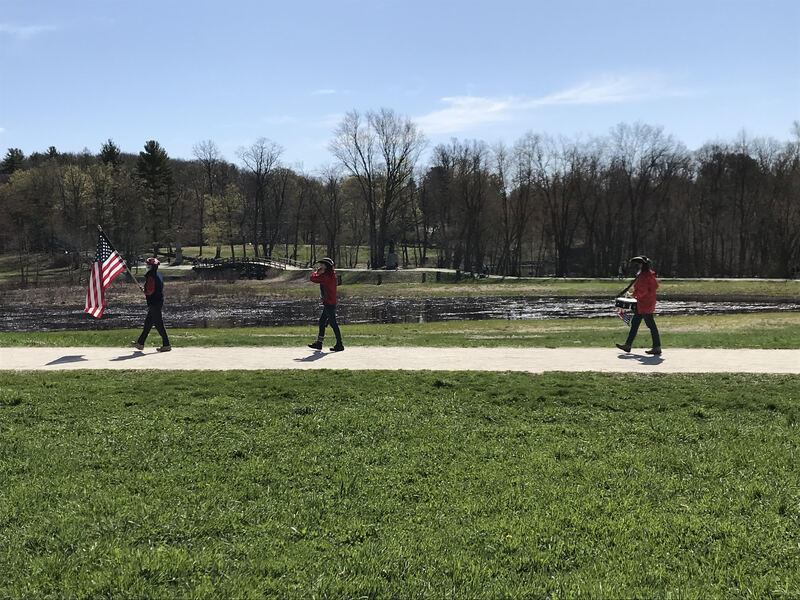 2021-04-19
2021-04-19Three Sisters' Patriots Day Parade, Concord, MA
Three sisters raised in Concord, MA take up the American flag, fife, and drum and march up to Old North Bridge and subsequently through Concord Center to commemorate Patriots Day in Concord, MA, one of the battle sites in the Battle of Lexington and Concord that sparked the American Revolution. Due to COVID-19, the famed Patriots Day Parade in Concord has been cancelled in both 2020 and 2021, and the Concord Minutemen--mainstays for the parade's performers--have been unable to play for the holiday. These three sisters, during both 2020 and 2021, took initiative to keep the long-standing tradition alive for the town and others who are typically attracted to Concord on this historical day. One of the sisters, the fifer, is a member of the Concord Minutemen. -
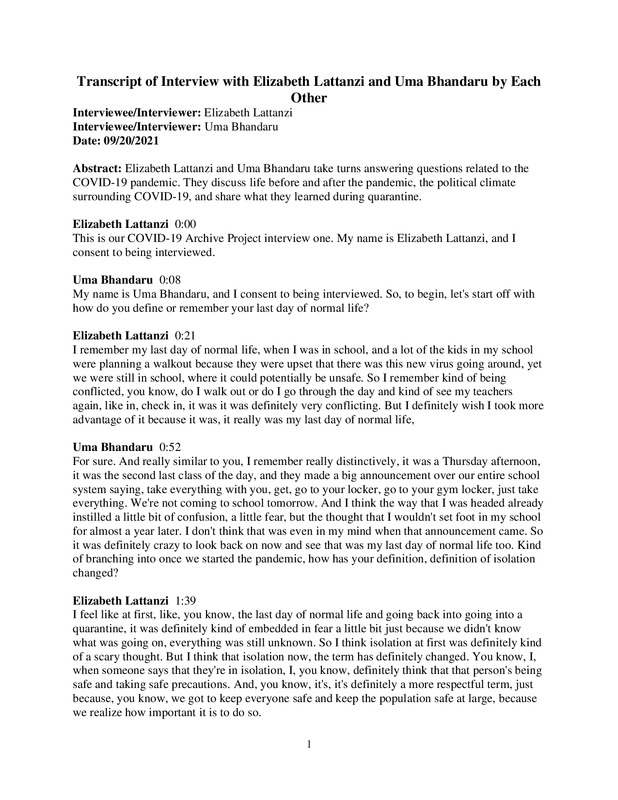 2021-09-20
2021-09-20Covid-19 Archive Project
-
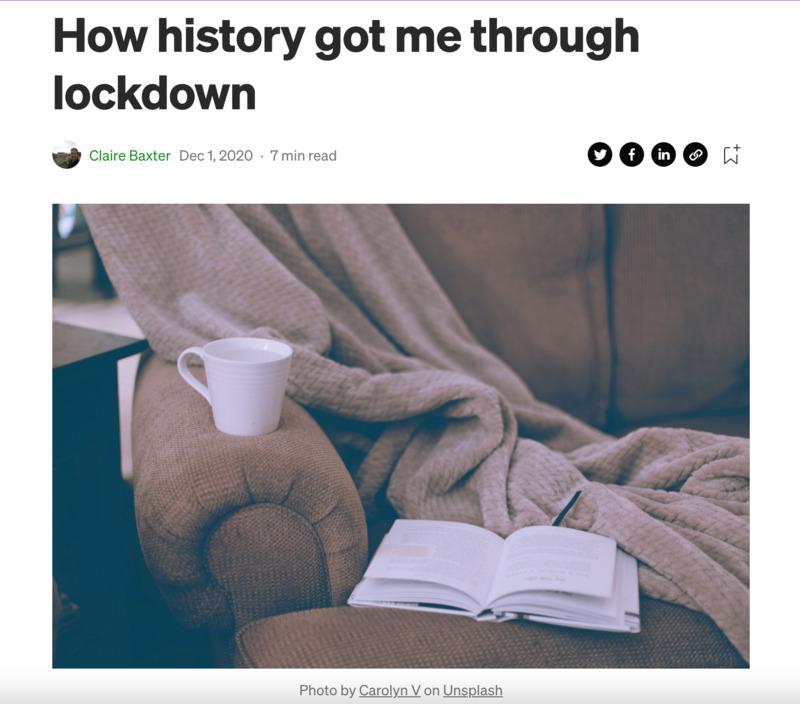 2020-12-01
2020-12-01How history got me through lockdown
A story I wrote about using history to keep a sense of perspective and gratitude through Melbourne's long lockdown in 2020. Coming against a background of university job losses and policies disfavouring humanities degrees I also wanted to let historians know that their work is important and has relevance. -
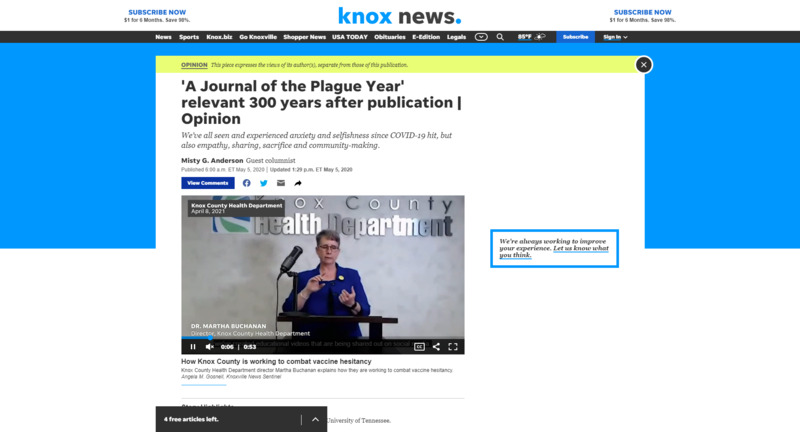 2021-06-02
2021-06-02'A Journal of the Plague Year' relevant 300 years after publication
During the pandemic, I took a graduate history course in which we read Daniel Defoe's 'A Journal of a Plague Year.' I had read the piece about 5 years before, but I missed so many of its nuances because it all seemed so foreign. It was striking to me both how much and how little has changed from 1665 to 2020/21. Quarantine, death tolls, travel bans, hoarding had all suddenly become commonplace occurrences that I could relate to. The centuries may have changed our technology drastically, but nothing seems to have changed about the human condition nor the human spirit. -
2021-05-19
Dr. Katherine Culkin, HIS-class collection
The collected works of Professor Katherine Culkin's History (HIS 20) classes. -
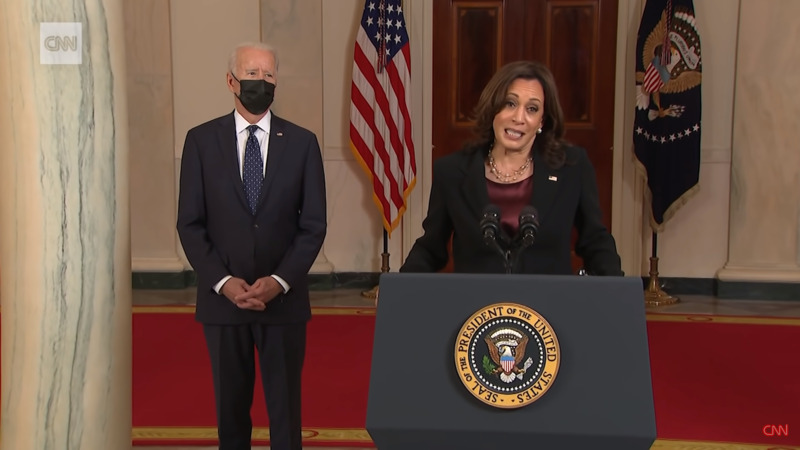 2021-04-20
2021-04-20Biden and Harris speak after Chauvin verdict
President Joe Biden and Vice President Kamala Harris speak after a jury found Derek Chauvin guilty of all charges in the murder of George Floyd. "A Measure of Justice is not the same as Equal Justice" President Biden and Madam Vice President Harris talk about social justice, racism, history, and plans moving forward. -
 2021-03-27
2021-03-27Fox News Perspective
Living in a divided nation I felt it necessary to follow various news outlets. I've realized that many times the truth usually lies somewhere in the middle. Actually, I think the truth usually lies somewhere closer to the left side but that's beside the point. I found this post by Fox News to be interesting because it talks about how conservative TV Host Laura Ingram thinks history will be written. I rarely agree with anything Fox News posts but in this case, I agree that history will record the many villains that have been exposed during the pandemic. I agree that many special interests bodies will be listed but I don't think it will include teachers. I don't think it's farfetched to say that the conservative's push to return back to school has more to do with money and less to do with children. It's funny how she says it's time to "follow the science" where were these conservatives when science said masks help stop the spread of COVID? -
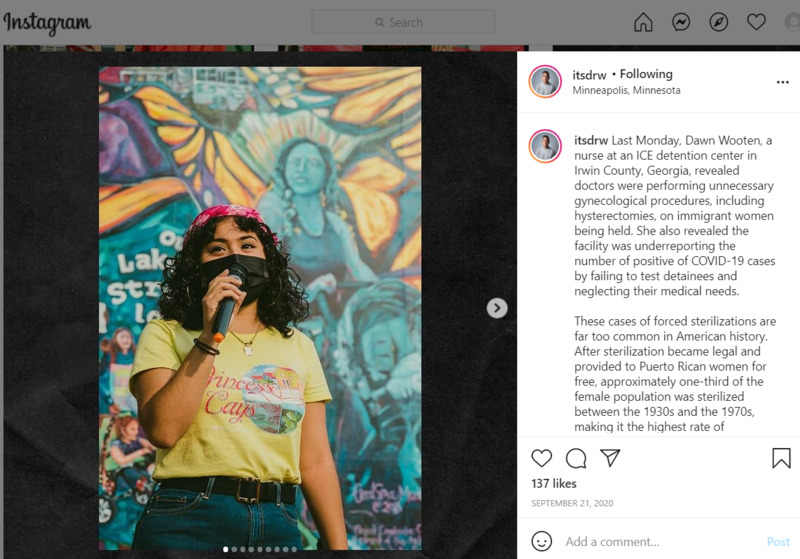 2020-09-21
2020-09-21Protests against ICE, Forced Sterilization and Under Reporting of Covid-19 Cases in Detention Centers
Last Monday, Dawn Wooten, a nurse at an ICE detention center in Irwin County, Georgia, revealed doctors were performing unnecessary gynecological procedures, including hysterectomies, on immigrant women being held. She also revealed the facility was underreporting the number of positive of COVID-19 cases by failing to test detainees and neglecting their medical needs. These cases of forced sterilizations are far too common in American history. After sterilization became legal and provided to Puerto Rican women for free, approximately one-third of the female population was sterilized between the 1930s and the 1970s, making it the highest rate of sterilization in the world. Health workers encouraged the procedure through door-to-door visits and employers showed favoritism towards sterilized women. I highly recommend a short documentary called La Operación available online about this US-imposed sterilization policy in Puerto Rico. -
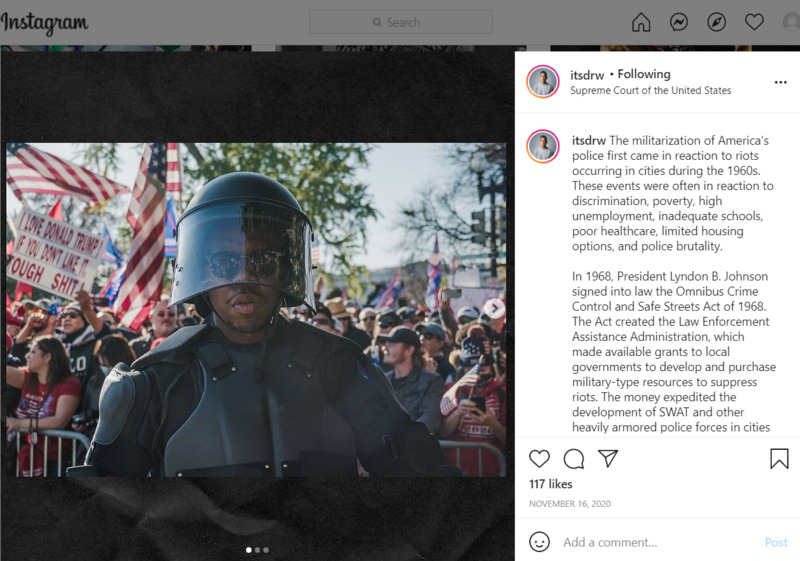 2020-11-16
2020-11-16Militarization of Police
The militarization of America's police first came in reaction to riots occurring in cities during the 1960s. These events were often in reaction to discrimination, poverty, high unemployment, inadequate schools, poor healthcare, limited housing options, and police brutality. In 1968, President Lyndon B. Johnson signed into law the Omnibus Crime Control and Safe Streets Act of 1968. The Act created the Law Enforcement Assistance Administration, which made available grants to local governments to develop and purchase military-type resources to suppress riots. The money expedited the development of SWAT and other heavily armored police forces in cities to counteract uprisings. -
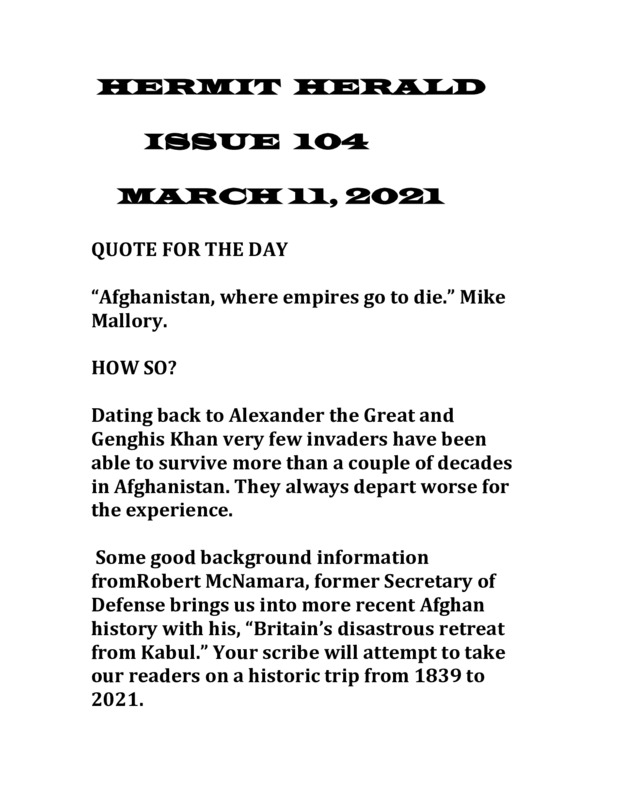 2021-03-11
2021-03-11hermit HERALD, ISSUE 104
"Afghanistan, where empires go to die"
